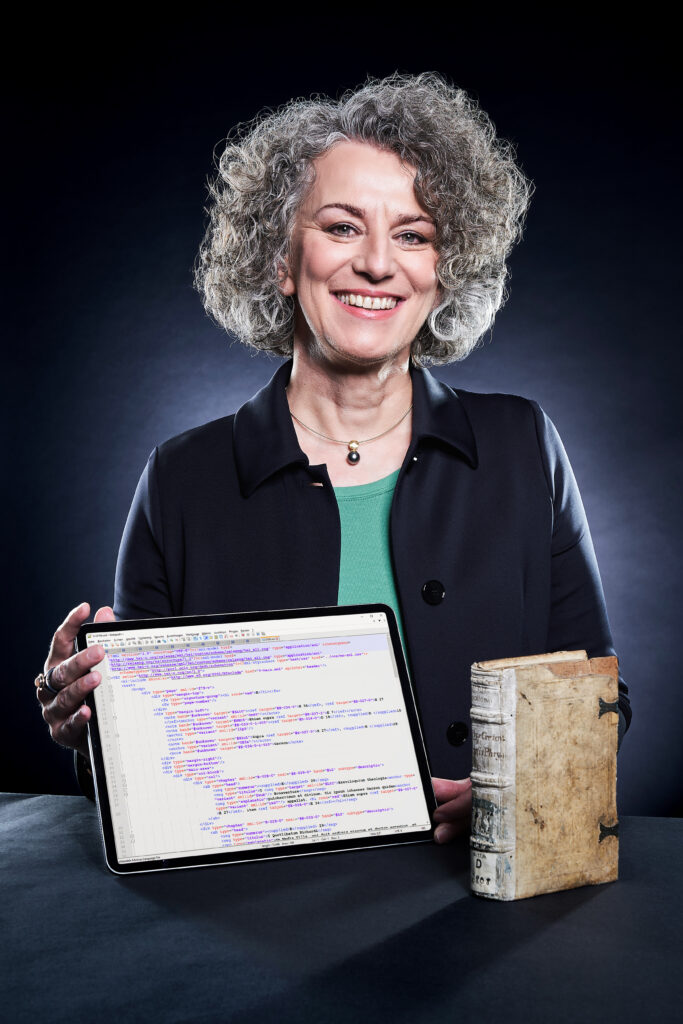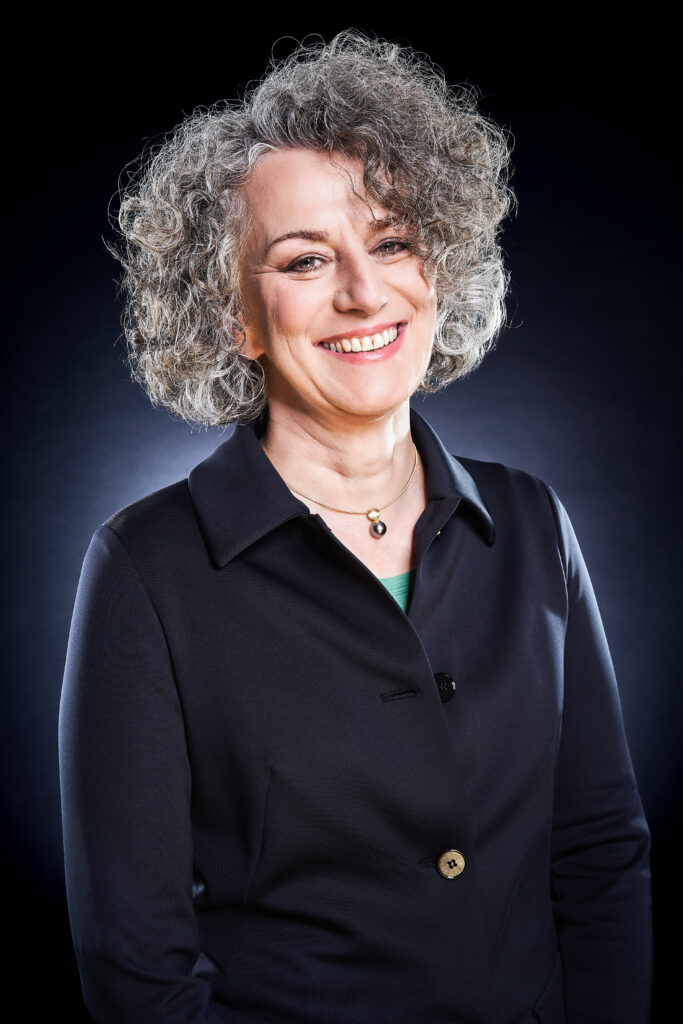Dr. Antje Kellersohn: Immer geradeaus kommt frau nicht weit

„Trau dich.“ – das rät Antje Kellersohn, Direktorin der Universitätsbibliothek Freiburg, all jenen, die vor einer großen Entscheidung stehen. Unser Gespräch führen wir in ihrem modernen Büro, ganz ohne staubige Bücherregale aus Eichenholz oder knarzende Trittleitern. Auf ihrem Schreibtisch stehen mehrere Bildschirme, deren Farbe und Form an die Fassade der UB erinnern. „Trau dich“ sind zwei einfache, aber wichtige Worte. Besonders wenn es darum geht, den Mut für eine Neuorientierung zu finden. So, wie es Antje Kellersohn gewagt hat.
Von Haus aus ist die UB-Direktorin Chemikerin. Die ersten Schritte ihrer wissenschaftlichen Karriere ging sie in den Neunzigern als Doktorandin an der Universität Siegen. Sie forschte zu nanokristallinem Kupfer, winzigen Kristalliten aus nur wenigen Atomschichten. Sie erinnert sich daran, wie laut es im Labor war, überall Schläuche, Kabel und Displays. Beängstigend? Zu Anfang vielleicht schon, gibt Antje Kellersohn zu. Ein Kollege fragte sie in ihren ersten Tagen, ob sie mit einem Lötkolben umgehen könne. „Ja, das kann ich!“, antwortete sie beherzt – dann kam ihr der Gedanke: Hätte er diese Frage auch einem männlichen Kollegen gestellt? Lange Jahre war sie die einzige Frau in ihrer Forschungsgruppe. Eine große Sache hat sie daraus allerdings nie gemacht. Sie habe sich eben behaupten müssen, ganz wie ihre männlichen Kollegen auch.
Mit dem Satz „Ich hole etwas weiter aus, ich sage gleich, wieso.“, beginnt die Geschichte, wie Antje Kellersohn in die Bibliothek kam. Für ihre Dissertation benötigte sie japanische Patentschriften. Heutzutage? Kein Problem! Im Online-Katalog suchen, eine der vielen Lizenzen der Universitätsbibliothek nutzen, via DeepL übersetzen lassen. Aber damals gab es diese einfachen Lösungen noch nicht. Die junge Doktorandin findet sich auf einmal hinter den Kulissen der Bibliothek wieder und lernt dort die Welt der wissenschaftlichen Fachreferate kennen. Begeistert entscheidet sie sich für einen damals eher ungewöhnlichen Weg – von der naturwissenschaftlichen Promotion ins Bibliotheksreferendariat. Eben nicht in die Industrie oder in die Forschung. „Da entsteht in meinen Augen eine spannende Biografie“, meint Antje Kellersohn. Wer sich neu orientiert, der kann sein Wissen und seine Erfahrungen auch neu einbringen. Und gerade im Bibliothekswesen kamen der Diplom-Chemikerin ihre guten IT-Kenntnisse gelegen.
Eine Universitätsbibliothek ist so etwas wie das Gehirn der Uni. Hier liegt das ganze Wissen gespeichert und wartet darauf abgerufen, genutzt und ergänzt zu werden. Gemeinsam mit ihrem Team koordiniert Antje Kellersohn dieses Gehirn, das in Freiburg fast dreieinhalb Millionen Medieneinheiten beheimatet, mehr als sechzig Fachbibliotheken betreut und zwischen Forschenden, Studierenden, Lehrenden und externen Nutzer*innen balanciert. Was bedeutet es, hier einen permanenten Zugang zu Wissen zu schaffen, damit Wissenschaft überhaupt funktionieren kann?
Zum einen, meint Antje Kellersohn, geht es darum, einen Ort zu kreieren, an dem man gerne arbeitet. Sie kam nach Freiburg, als mit dem Bau der heutigen UB begonnen wurde, also viel Neuland. Und was macht die Direktorin? Als es an die Innenausstattung geht, lädt sie erstmal das gesamte Personal in die Mensa ein, um Vorschläge zu diskutieren. Auch mit den Studierenden ist sie von Anfang an im Gespräch. Für Antje Kellersohn ist die Bibliothek eben ein „Wir“. Zum anderen geht es darum, Wissen auch nachhaltig nutzbar zu machen. Aber was heißt denn nachhaltig, wenn es um Wissen geht?

Antje Kellersohn schmunzelt und antwortet, dass es davon abhänge, wen man frage. „Wir haben Papyri aus der Antike, Steintafeln, Lehmtäfelchen aus dem Römischen Reich, wir haben frühmittelalterliche Handschriften“, aber eben auch einen gigantischen „Datenwust“, den beispielsweise die Hochenergiephysik hervorbringt. Große Serverleistungen, die diese Daten speichern, ebenso wie standardisierte Temperatur- und Feuchtigkeitsbedingungen für Pergamenthandschriften, stehen in krassem Gegensatz zu einem Gebäude, das möglichst energieeffizient betrieben werden sollte. Ein weiteres Spannungsfeld für Antje Kellersohn. Nebenbei führt sie knallharte Verhandlungen mit den ganz Großen: Springer Nature, Elsevier und Wiley. Um mit diesen Verlagsgruppen Lizenzverträge zu vereinbaren, haben sich deutschlandweit Bibliotheken im Projekt DEAL zusammengetan. Hier war Antje Kellersohn jahrelang Sprecherin der Projektgruppe und leitete die Projektgeschäftsstelle.
Muss da ihr Tag nicht mehr als 24 Stunden haben? Kellersohn lacht. Seit 30 Jahren versuche sie das zu ändern, aber bisher ohne Erfolg. Sie betont: „Nichts ohne mein Team, das wäre nicht machbar.“ Allein könne sie das nicht stemmen und die UB sei ganz klares Teamwork.
Und so arbeitet eine Diplomchemikerin mit Promotion zu nanokristallinem Kupfer an der Digitalisierung jahrhundertealter mystischer Bücher mit. Für Antje Kellersohn kein Widerspruch. In einer Universitätsbibliothek kommen eben die verschiedensten Wissenschaften zusammen. Deshalb hat sie noch einen zweiten Rat parat: „Lass dich nicht in ein festes Raster pressen!“
Portrait von Theresa Mayer
Teresa Mayer steht gerade noch mit einem Bein im Bachelor, in dem sie Geschichte, Philosophie und Englisch studiert. Mit dem anderen schreitet sie gen Master, wo sie sich auf Geschichte fokussieren wird, in der Hoffnung, ihre Leidenschaft auch zum Beruf zu machen. Ausgleich zum Studium findet sie beim Tanzen (aktuell am liebsten Salsa), auf Konzerten oder im Café mit Freund*innen. Der Akzent in ihrem Englisch rührt von einem überraschend sonnigen Auslandssemester in Irland her.